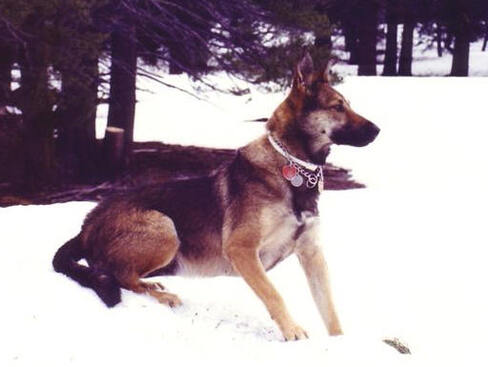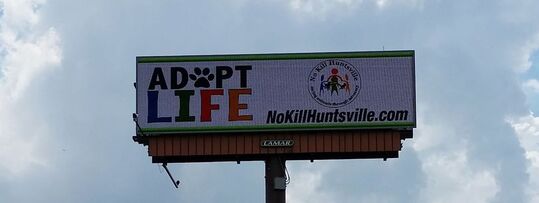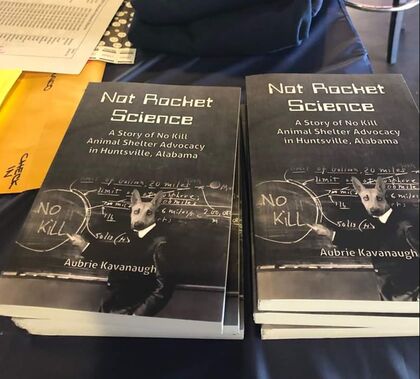|
All of us have crossroads in our lives. Points in our lives were some significant event happens that puts us on a path different from what we had anticipated. One crossroads for me was in 2006 after the euthanasia of 16-year old dog, Snake. We knew that she would not be able to stay. She had become trapped inside a body which no longer served her well and had begun having cognitive problems. We didn't want her to suffer. We had our veterinarian come to our house on April 22, 2006 to euthanize her. Although we had been planning for the day for quite some time, we didn’t choose the date ahead of time. She had had a rough night and we decided that morning to let her go. We didn’t realize until much later that we had chosen Earth Day to let her go. It seems fitting in many ways. Snake was a coydog; she was part German shepherd and a coyote. She was always a little bit of a wild child. We buried her on our property and gave her back to the Earth; a fitting farewell for such a beautiful soul. It was after the loss of Snake that events happened that I didn't anticipate in which put me on another path. As much as we prepare, we are never really ready to lose those we love. How can we be? I didn’t adjust well and found that I needed an outlet. I started donating to the animal shelter in the city where I work, hoping to help some other dog or dogs. It was only after donating to the shelter for a few months that I had an unwelcome epiphany about what was happening there. Healthy and treatable animals were being destroyed every day along with the sick and suffering. I guess I should have known this was happening, but I just didn't. I think that's common for a lot of people in America. We presume that shelters use our tax dollars to function consistent with public values when that is not always the case. I know what the word euthanasia means and what was happening at this shelter was far from it in most cases. Learning what was happening at my local shelter outraged me, angered me, and just made me feel tired and sad. But it also fueled me. I began a path of self-education. Why were animals who were perfectly healthy dying in shelters? Was it just something in the South? Was this happening everywhere? I just had to know these answers. My education took years and continues to this day. This journey of awareness led me to another crossroads. I had two choices. I could continue my education while lamenting what was happening. I could say the issue was just too big for me to take on myself. Or I could try to do something about it. In the end I decided I had to act because I saw it as a moral imperative. If I did not speak up, my silence would have been my consent. Exactly what I would do with my intent and knowledge would end up taking years. I originally wrote to City officials in 2006 to express my outrage at what was happening at the shelter and didn't get very far. I was pretty much told this is just the way things are and we can’t afford to do any better. I didn’t believe either statement. The city in which I work is Huntsville, Alabama. The community is both incredibly progressive and proud. People from other states and even other countries live here. We have a large military base and we support the space program through the Marshall Space Flight Center. We are considered a medical hub where people come to get specialized treatment. Considering all the great things happening in the city, surely we could break from the status quo and do a better job to save the lives of shelter animals. The city council did not agree. I was left to stew in what I had learned, continue my education and look for some other opportunity to be a change agent. I found this incredibly hard to do. With each passing day, the lives of animals were at risk. Animals just like Snake who no doubt would have been killed in the Huntsville shelter. The deaths of both my parents to cancer in a six-month period of time ended up being another crossroads for me. We lost dad in October of 2010. We lost mom in April of 2011. We knew they would leave us and tried to be ready. There is just no such thing. Like the loss of Snake, the loss of my parents put me in a different place in my life than I anticipated. For most of my life I had allowed myself to think that I would have decades left to spend time with my parents. I had always known that life was short and precious, but the loss of my parents quite suddenly really reinforced for me that my own time here is finite. I thought that in spite of personal failure to affect change in my area that I may do better if I got some help. That is when I decided to form an advocacy group called No Kill Huntsville. I believed that rather than speaking out about the issue by myself, surely there had to be strength in numbers. The group was pretty large when we started, but as is the case with many things, lots of people talk but only some people do. We ultimately ended up with a small group of like-minded folks who agreed to speak with one voice to try to effect change in our area. No Kill Huntsville is now and in our 10th year of advocacy. It hasn’t been easy, but we got what we hoped for: change. The changes which have been made at the tax-funded animal shelter are both shocking and incredibly rewarding. We always promoted, and still promote, the No Kill Equation first shared with the world by Nathan Winograd in his 2009 book called “Redemption: The Myth of Pet Overpopulation and the No Kill Revolution in America.” The book was a game changer for me as it has been so many other people who have read it. There will always be differences of opinion or how we got to a point where the shelter was destroying three out of every four animals to a point where the shelter is saving approximately 97% of the animals. It’s hard for people to admit that change can be ugly and uncomfortable. I feel confident that but for the advocacy of our group, little would have changed. The shelter was making incredibly slow progress at the time we first took our issue to the public and got really vocal about it in the area. We were vilified in the community. At one point we were called terrorists. But I know we made a difference. There was an episode of a program called MythBusters years ago that had to do with the benefit of slapping someone across the face. The show is no longer being produced but I'm sure the episode is still out there somewhere. What was being investigated was if someone's behavior really can be modified after having been slapped across the face. The results of the tests confirmed that be to be the case. A lot of people criticized our advocacy during the most difficult years because they focused on the messenger and not on the fact that the message was necessary in the first place. We were told to be nicer, to stop being so critical. We were told that we just had to go along. I know for myself that we were always incredibly diplomatic and respectful. The worst-case scenario for me is that our advocacy served as a slap across the face to city officials and the public to get them to wake up and see that things not only should be but different but could be different. I know our efforts were much more than that, of course. In the summer of 2018 I had a meeting with documentary film maker Anne Taiz who was working on a film about No Kill animal shelter philosophies and programs. Anne traveled to Huntsville as part of her research to talk to me about what our group had done to that point. Toward the end of our meeting Anne said, “you know, you really should write a book about this.” I'm pretty sure that I laughed. Although I had been blogging and writing about our experiences over a period of years, I never really considered writing a book. What would it say? Who would even read it? Would it help anybody? After thinking about it for a few months, I decided again that life was short and that my time here was not guaranteed. Why not write a book if it could help other people? I self-published my book about on Amazon on April 22nd, 2019, the anniversary of Snake’s passing. The whole point in publishing a book was to help other people in other places. People like me. People like people in our advocacy group who were just common folks in the weeds with full-time jobs who came together because we knew that somebody had to do something. It had been years since Nathan Winograd had published Redemption and I thought it might help some people to learn how we used the No Kill Equation to change things in our area. After consulting with attorneys at work, I got umbrella insurance before I published the book. I know from my work in the legal field for almost three decades that the ability to defend a lawsuit and the ability to prevent a lawsuit are not the same. Thankfully, the two-year statute of limitations to sue me has now run. The book is priced to print which means no money is being made. When people order the book, they’re paying for the cover and the paper. As is the case with many small acts of advocacy for the sake of animals, I guess I'll never really know how much good the book has done. I've gotten a lot of feedback in the last couple years from people that told me that it really did make a difference for them. They had situations similar to ours and they just didn't even know where to start or what to do. Reading the book gave them the information and the courage that they needed to speak out for the sake of animals in their own area. The book will never be a bestseller and I fully acknowledge that it has kind of a narrow audience. But I feel pretty good about it. I feel like it served the purpose and hopefully will continue to serve its intended purpose for a period of years to come. I asked some folks for feedback to share with this blog and would like to thank them for helping me. If you know shelter animals in your area are being destroyed needlessly, know that you really can make a difference to affect change. It takes information, time, passion and commitment, but you can be a force for good. Choose the path that is the most important to you. You never know how far you will travel or what you can accomplish if you don't try. I recommend this book to everyone interested in animal rescue or sheltering. I like to highlight key points as I read, but if I had done that with this book, the entire thing would have been highlighted. After reading it, I purchased multiple copies for local shelter managers and fellow animal rescuers. It's a perfect ‘cliff notes' version of Nathan Winograd's Redemption and a practical ‘how to’ study rolled into one. It should be required reading for anyone who cares about animals.” - Jennifer Watkins, Shelter to Home, Inc., Wyandotte, Michigan Not Rocket Science may have been written about Huntsville, Alabama, but it is the disturbing reality of our broken ‘shelter’ system everywhere. The book very accurately describes the perils currently faced by homeless animals in the majority of municipal animal control facilities across the US. As an advocate in Georgia, I have had far too many of the same experiences that Aubrie describes. This book is essential reading for any animal welfare advocate and I highly recommend it to all animal lovers. There will be both sad and happy tears as you follow the courageous and inspiring journey of the No Kill Huntsville team. But, at the end, you will have a concise, comprehensive resource and a determination to be part of the solution. Ignorance and apathy are the enemies. For about $5, this book can help you overcome both at your local ‘shelter.’" - Shari Cahill, Silver Comet Animal Welfare Alliance, Milton, Georgia Not Rocket Science: The Story of No Kill Animal Shelter Advocacy in Huntsville, Alabama is the up-close, inside story of what it took to bring a highly regressive, open-admission animal control shelter to save rates in the mid and upper 90%. A must-read for advocates seeking to bring No Kill to their communities, Not Rocket Science presents the unvarnished truth behind this inspiring and remarkable transition. If you have heard about the inspiring tale of Huntsville's success, but have not read this book, you don't really know how the City of Huntsville became one of the most exciting shelter stories in the nation. Order it today." - Mike Fry, No Kill Learning. Minneapolis, Minnesota Aubrie Kavanaugh has written a seminal book, It’s Not Rocket Science, about modern animal shelter reform. Although the No Kill Movement has been around for decades, the last 10 years has seen a surge in successful animal shelter reform driven by advocates like the author, Aubrie Kavanaugh and her associates. Nathan Winograd’s Redemption from 2008 was the formative publication that launched a revolution in modern animal shelter reform. It’s Not Rocket Science shows us how the philosophy Winograd presented is now proven to succeed with a clear history of the reform of Huntsville, Alabama.” - Davyd Smith, No Kill Colorado, Denver Colorado Not Rocket Science is an unvarnished look at the hard work required to make progress toward no kill in a resistant environment. It is an excellent step by step guide for no kill advocates who want to take action in their own community but aren't sure how to start and, more importantly, how to keep going when hitting roadblocks." - Shirley Marsh, Yes Biscuit, South Carolina
0 Comments
Your comment will be posted after it is approved.
Leave a Reply. |
AuthorI am an animal welfare advocate. My goal is to help people understand some basic issues related to companion animals in America. Awareness leads to education leads to action leads to change. Archives
July 2024
Categories
All
image courtesy of Terrah Johnson
|




 RSS Feed
RSS Feed